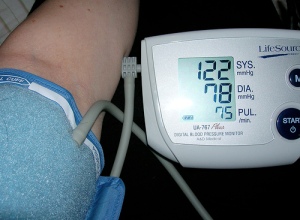I saw my cardiologist yesterday for my six months check up. The medical assistant was amazed that I’ve lost weight. She told me that my weight was 126 in May 2015. I told her that I was 121 that day she weigh me in. She said that different scale has different results. I was very surprised with her response because she did not point out that everything from my clothes to my shoes add up to the weight reading on the scale. I mentioned that to her and told her that when I weigh myself in the morning, I don’t have any clothes on to get my correct weight. 
Yesterday, I had to remove my sweater and my sandals so that at least my weight at the doctor’s office is not way too off from my weight in the morning. Being my appointment was in the afternoon, I had already eaten and had drank some water already. At least, the difference in my weight was about 4 pounds. The doctor’s office scale indicated I was 109 pounds, while my morning weigh in was 105.6 pounds.
I’ve realized, too, that when they take my blood pressure at my cardiologist office, my blood pressure was way too high. Yesterday my BP reading was 200/80.  That was too high and inaccurate. The medical assistant and the doctor said that I may have a white coat hypertension. When I think about it now, I may surely be suffering with that kind of hypertension, but only at the cardiologist office. Another medical assistant took another reading and the systolic level went down to 168 which was still high. At my regular doctor, I never get that kind of very high blood pressure reading.
That was too high and inaccurate. The medical assistant and the doctor said that I may have a white coat hypertension. When I think about it now, I may surely be suffering with that kind of hypertension, but only at the cardiologist office. Another medical assistant took another reading and the systolic level went down to 168 which was still high. At my regular doctor, I never get that kind of very high blood pressure reading.
According to Wikipedia:
White coat hypertension, more commonly known as white coat syndrome, is a phenomenon in which patients exhibit a blood pressure level above the normal range, in a clinical setting, though they don’t exhibit it in other settings. It is believed that the phenomenon is due to anxiety that those afflicted experience, during a clinic visit.
The patient’s daytime ambulatory blood pressure is used as a reference as it takes into account ordinary levels of daily stress. Many problems have been incurred in the diagnosis and treatment of white coat hypertension.
The term “masked hypertension” can be used to describe the contrasting phenomenon, where a patient’s blood pressure is above the normal range during daily living, although it isn’t above the normal range when the patient is in a clinic setting.
Diagnosis
In studies, white coat hypertension can be defined as the presence of a defined hypertensive average blood pressure in a clinic setting, although it isn’t present when the patient is in other settings. Diagnosis is made difficult as a result of the unreliable measures taken from the conventional methods of detection. These methods often involve an interface with health care professionals and frequently results are tarnished by a list of factors including variability in the individual’s blood pressure, technical inaccuracies, anxiety of the patient, recent ingestion of pressor substances, and talking, amongst many other factors. The most common measure of blood pressure is taken from a noninvasive instrument called a sphygmomanometer. “A survey showed that 96% of primary care physicians habitually use a cuff size too small,” adding to the difficulty in making an informed diagnosis. For such reasons, white coat hypertension cannot be diagnosed with a standard clinical visit. It can be reduced (but not eliminated) with automated blood pressure measurements over 15 to 20 minutes in a quiet part of the office or clinic.
Mayo Clinic explanation of white coat hypertension here at:
There must be something that is stressing me out every time I see my cardiologist. Thank goodness that I have a daily log of my blood pressure readings and my daily weight that I can show to my GP and my cardiologist for the correct BP readings at home. It’s frustrating because now doctors can email their patients their medical records and the patients will see what they have recorded at their end. I hate to say it, they are mostly wrong information and limited in scope. Mine showed a wrong height, wrong BP reading info and seem that it did not show what my cardiologist and I had conversed about my health progress.
He asked me what did I do to lose weight. I explained what regimen I have done which I have posted here on my blog. He seemed to be writing down the information. And he agreed that diet and the type of foods I have eaten in the past months helped me tremendously. He also concurred that blood pressure goes down when a person loses weight. He repeated that my heart is in good shape, very healthy according to the echocardiogram and the nuclear tests in May 2015; and he added that the pain I might have experienced in the past was probably gas from indigestion, which made sense. He commended me for taking a proactive role with my health.
There were minor findings from my nuclear test that he needs to monitor, so he wanted to see me in six months for another echocardiogram. I guess I only suffer white coat syndrome at the cardiologist office and not with my Primary Care Physician or come to think of it, if they don’t ask me to take a test or two for preventive care. I think I may have to pass this up next time they told me I’m due for a preventive assessment review.
Maybe because my cardiologist and his office are not in sync with my current health updates, I guess I feel frustrated and it is stressing me out in the back of my mind. Especially, when I viewed my current medical record with them yesterday. It looked like nothing has changed in my condition except my weight. I guess they do not have time to build a relationship with their patients being pretty busy with other patients. I guess I might just have to take this whole thing with a grain of salt.
My overall health is really in my hands. I cannot depend on conventional doctors to take care of my health. I have to accept the facts that their medical records about me would be erroneous because no one really pay attention on correcting them and they based things on what their medical instruments tell them whether it’s wrong or not. I just have to leave it at that. I have to take care of myself by continuously being proactive with my healthy eating habits , reading articles about health from functional and alternative doctors and learn from them. If I keep on eating the right foods
, reading articles about health from functional and alternative doctors and learn from them. If I keep on eating the right foods  and eating less and do my daily intermittent fasting,
and eating less and do my daily intermittent fasting,  staying away from most of the processed foods, drinking water, have a good night sleep schedule; my conventional doctors would just be saying on the back of their heads: “there goes my business!” Just leave them in wonderment. Really, when you’re ill and naïve about your health and uneducated, it’s easy for conventional doctors to whip up any kind of diagnosis. It’s really trial and errors with them because they don’t really know you and your body personally.
staying away from most of the processed foods, drinking water, have a good night sleep schedule; my conventional doctors would just be saying on the back of their heads: “there goes my business!” Just leave them in wonderment. Really, when you’re ill and naïve about your health and uneducated, it’s easy for conventional doctors to whip up any kind of diagnosis. It’s really trial and errors with them because they don’t really know you and your body personally.
http://www.ehow.com/how_5013527_avoid-white-coat-syndrome.html
According to ehow.com, there’s a way to avoid White Coat Syndrome:
- From the evening before you go to the doctor, stop drinking water. If you have less water, you will have lower blood pressure. The only reason you’re not drinking water is so you can have a few uneventful doctor’s visits without the high blood pressure speech. If you do this, make sure you test yourself so you know you don’t have high blood pressure.
- On the way to the doctor, listen to pleasant music. Smile. Enjoy life. Drive slowly. Do everything to be relaxed on the way to the doctor. Ignore the stresses of your life. Do not think or worry about white coat syndrome. What’s on your mind can have a huge effect on blood pressure, so it’s best to be relaxed as much as possible.
- Walk slowly into the doctor’s office. Excessive physical exertion will raise blood pressure.
- Stay relaxed the whole time at the doctor. Meditate. Smile at the world. Close your eyes. If you have somebody with you, fall asleep while you wait, which will make you very relaxed and lower blood pressure
- After you get a normal blood pressure reading and avoided the high blood pressure speech, congratulate yourself on a job well done. You’ve conquered White Coat Syndrome on this visit.

- Tell your doctor about your white coat syndrome. This is the most important step.The doctor’s job will be to determine how pervasive your white coat syndrome is. He calls it white coat hypertension, which is still just as serious as regular hypertension or high blood pressure. On one hand, your blood pressure may be normal during the rest of the day, which means blood pressure meds will give you hypotension (low blood pressure). On the other hand, high blood pressure during other stressful parts of the day (other than the doctor’s visit) may warrant treatment of white coat hypertension. In many cases, the doctor will still want to prescribe you blood pressure meds anyway because if you’re stressed from doctor’s visits, you’re probably suffering hypertension during the other stressful parts of your life. If you have other factors such as heart disease or overweight, your doctor might err on the side of caution and diagnose white coat hypertension. Your doctor will do what’s right for you. If he prescribes you meds anyway, it’s not a defeat. He’s doing you a favor in treating white coat hypertension.
And take a deep breath!

